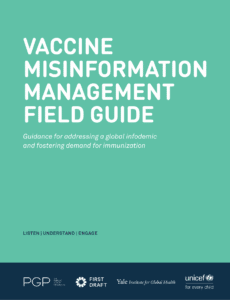Misinformation Alerts
Knowing what misinformation is being shared can help you generate effective messaging.
These insights are based on a combination of automated media monitoring and manual review by public health data analysts. Media data are publicly available data from many sources, such as social media, broadcast television, newspapers and magazines, news websites, online video, blogs, and more. Analysts from the Public Good Projects triangulate this data along with other data from fact checking organizations and investigative sources to provide an accurate, but not exhaustive, list of currently circulating misinformation.
Misinformation Alerts
Knowing what misinformation is being shared can help you generate effective messaging.
These insights are based on a combination of automated media monitoring and manual review by public health data analysts. Media data are publicly available data from many sources, such as social media, broadcast television, newspapers and magazines, news websites, online video, blogs, and more. Analysts from the Public Good Projects triangulate this data along with other data from fact checking organizations and investigative sources to provide an accurate, but not exhaustive, list of currently circulating misinformation.Alerts are categorized as high, medium, and low risk.
- High risk alerts: Narratives with widespread circulation across communities, high engagement, exponential velocity, and a high potential to impact health decisions. Are often more memorable than accurate information.
- Medium risk alerts: Narratives that are circulating in priority populations and pose some threat to health. Potential for further spread due to the tactics used or because of predicted velocity. Often highlights the questions and concerns of people.
- Low risk alerts: Narratives that are limited in reach, don’t impact your community, or lack the qualities necessary for future spread. May indicate information gaps, confusion, or concerns.
A widely circulated article is claiming the CDC has inflated the number of COVID-19 deaths by 1600%, due to changing the way COVID-19 deaths are recorded. This claim had been fact-checked and found to be false previously, but has resurfaced due to routine guidance coming from the US National Center for Health Statistics on updating COVID-19 mortality data collection codes for a World Health Organization system (not the CDC). Death reporting has not changed significantly in the US during the pandemic, and health officials actually believe COVID-19 deaths are undercounted.
Recommendation: Addressing this misinformation could distract from priority talking points. Fact Checking Source(s):healthfeedback.org
A video is being shared in which an (unverified) Certified Nursing Assistant (CNA) claims that there were zero fatalities from COVID-19 in the nursing home he works in, until COVID-19 vaccinations began. Vaccine opponents on social media are hailing him as a hero and calling for more healthcare workers in nursing homes to come forward and act as "whistleblowers." Some social media users have stated that in remaining silent, healthcare workers are allowing their government to commit "geriatricide."
Recommendation: Addressing this misinformation could distract from priority talking points. Continuing to promote the safety and efficacy of COVID-19 vaccines, including the reporting and investigation of all adverse events following vaccination, is recommended. Fact Checking Source(s):cdc.gov, news.yahoo.com, vaers.hhs.gov
News is spreading that South Africa paused use of AstraZeneca-Oxford’s COVID-19 vaccine after a small-scale, unpublished study found it was less effective at preventing mild to moderate disease from the B1351 variant strain, dominant in South Africa. Misinformation is circulating that the vaccine is ineffective against all strains of the virus. Research studies are under way to confirm these preliminary findings, and to study the vaccine’s effectiveness in older adults, as some European countries the study’s earlier trials did not have sufficient data on this group. The World Health Organization has approved the AstraZeneca-Oxford vaccine for use in all adults, paving the way for its use in low- and middle-income countries.
Recommendation: While continuing to promote the safety and efficacy of COVID-19 vaccines should be prioritized, given the extraordinarily high public interest in COVID-19 vaccines updating any FAQ’s and informational resources that provide details on approved COVID-19 vaccines is recommended. Fact Checking Source(s):cidrap.umn.edu, theguardian.com, forbes.com
A presentation containing an extensive collection of social media posts all claiming personal experiences with adverse reactions to COVID-19 vaccines is being shared no multiple social media sites. The presentation was made to appear as if the CDC endorsed it. Domestic and international posts were included. Tech companies have been removing the presentation, but it has been shared hundreds of thousands of times.
Recommendation: Addressing this misinformation could distract from priority talking points. Continuing to promote the safety and efficacy of COVID-19 vaccines, including the reporting and investigation of all adverse events following vaccination, is recommended. Fact Checking Source(s): cdc.gov, vaers.hhs.gov, health.harvard.edu, fda.gov, fda.gov
Anti-vaccine advocates, including senior leaders in the movement, are claiming that requiring a COVID-19 vaccine is a violation of the Nuremberg Code and health care providers who administer the vaccines are guilty of war crimes.
Recommendation: Addressing this misinformation could distract from priority talking points. Continuing to promote the safety and efficacy of COVID-19 vaccines, and the importance of public health measures, is in itself refuting this misinformation. The Nuremberg Code was created to prevent non-consensual medical experimentation as a result of the war crimes committed by the Nazis. This claim as it relates to lifesaving COVID-19 vaccines is not only grossly inaccurate, but arguably anti-Semitic as it draws a false equivalency between the genocide of European Jews during the Holocaust of World War II with rigorously reviewed and internationally agreed-upon legal and ethical public health measures. Fact Checking Source(s): politifact.com, fullfact.org
A video claiming that COVID-19 vaccines are actually "gene therapy" is recirculating online. The video claims that 87,000 doctors and nurses have claimed the pandemic is overblown, that it is actually a typical flu, and that COVID-19 vaccines are unsafe. Medical credentials are highlighted to lend increased credibility to the widely debunked claims.
Recommendation: While addressing the majority of this misinformation could distract from priority talking points, updating FAQ’s and informational resources to explain the science and role of mRNA in vaccines is recommended. There continues to be substantial confusion among the public regarding mRNA. Fact Checking Source(s): apnews.com, factcheck.org, cdc.gov
A video from America’s Frontline Doctors, an organization reported by news organizations and fact checking groups as frequently sharing misinformation, was widely shared on social media. In the video, the group’s founder and CEO repeatedly refers to COVID-19 vaccines as “experimental,” and repeats debunked theories that the vaccines will cause infertility. The video encourages people to visit the group’s website to obtain a prescription for hydroxychloroquine through a telehealth visit with a pharmacy in Florida.
Recommendation: Despite evidence to the contrary, hydroxychloroquine continues to be widely promoted in social media as a cure or therapeutic for COVID-19. Given the continuing confusion, FAQ’s and other informational materials should be updated to address hydroxychloroquine’s recommended uses. Continuing to promote the safety and efficacy of COVID-19 vaccines can in itself address further misinformation. Fact Checking Source(s): medpagetoday.com, snopes.com, thelancet.com, covid19treatmentguidelines.nih.gov, nih.gov
To date, the CDC has not identified any cases in which a COVID-19 vaccine has caused a person's death. All reported adverse events following vaccination are being investigated. Despite this, some 180 deaths have been reported to the US-government endorsed and reviewed Vaccine Adverse Event Reporting System (VAERS), a passive surveillance system where any individual can self-report any health problem following immunization. VAERS does not require any proof to report an adverse event. Vaccine opponents have seized upon the reported 180 deaths to raise doubts about the safety protocols being used for mass COVID-19 immunization and to call for a halt to COVID-19 immunization. A longstanding criticism of VAERS by many of these same groups led them to recently create independent COVID-19 vaccine injury reporting systems, encouraging members of the public to report using these non-official systems rather than VAERS itself.
Recommendation: Self-reported morbidity and mortality allegedly due to COVID-19 vaccines has recently become a strategy by anti-vaccine organizations to undermine trust in government-backed reporting systems and investigations of adverse events. As this strategy is expected to continue, talking points should continue to regularly promote vaccines and their safety and efficacy, and familiarity with the US’ actual vaccine adverse event reporting system is encouraged for public health communicators: https://vaers.hhs.gov/ Fact Checking Source(s): vaers.hhs.gov
Facebook, Twitter, and TikTok users are claiming that a recent sharp increase in COVID-19 deaths in Gibraltar is due to its recently begun mass COVID-19 immunization. Multiple fact-checking sites have reported that the increase was in fact part of a trend that had started before vaccination began.
Recommendation: Addressing this misinformation could distract from priority talking points. Continuing to promote the safety and efficacy of COVID-19 vaccines, including the reporting and investigation of all adverse events following vaccination, is recommended. Fact Checking Source(s):reuters.com 
The 2020-2021 influenza season has shown lower-than-average reports of the flu, which most experts accredit to the public health measures in place to stop the spread of COVID-19. However, based on these low numbers, rumors are spreading that health officials have been falsely reporting influenza cases as COVID-19 cases, to make the pandemic appear more severe than it is.
Recommendation: Addressing this misinformation could distract from priority talking points. Continuing to promote seasonal flu vaccination and the safety and efficacy of all vaccines is recommended. Fact Checking Source(s): skepticalraptor.com
Alerts are categorized as high, medium, and low risk.
- High risk alerts: Narratives with widespread circulation across communities, high engagement, exponential velocity, and a high potential to impact health decisions. Are often more memorable than accurate information.
- Medium risk alerts: Narratives that are circulating in priority populations and pose some threat to health. Potential for further spread due to the tactics used or because of predicted velocity. Often highlights the questions and concerns of people.
- Low risk alerts: Narratives that are limited in reach, don’t impact your community, or lack the qualities necessary for future spread. May indicate information gaps, confusion, or concerns.
Vaccine Misinformation Guide
Get practical tips for addressing misinformation in this new guide. Click image to download, or see highlights.



